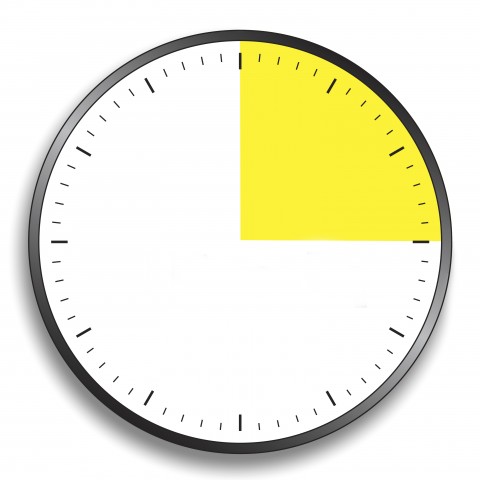
If you’re learning the Persian language or want to travel to a Persian-speaking country for a while, you must learn how to tell time in Persian and how to ask others for the time. For this, you need to know the key vocabulary and the important rules about hours, minutes, and days. In this article, we’ll guide you through everything you need to know about the time in Persian grammar so you can talk just like a native Persian speaker!
Are you ready? Let’s start!
For talking about the time in Farsi, first of all, you need to learn the numbers. After that, you need to learn and practice the basics, such as Persian vocabulary keywords related to time. In the table below, you’ll learn just a few of them:
| Time | زمان (zamaan) |
| Morning | صبح (sobh) |
| Night | شب (shab) |
| Hour | ساعت (saa’at) |
| Minute | دقیقه (daqiqe) |
| Second | ثانیه (saanie) |
| Day | روز (rooz) |
| Noon | ظهر (zohr) |
 Table of Contents
Table of Contents
- How to Ask for the Time in Persian
- What Time is the Event/Meeting/Appointment?
- How to Say the Hour in Persian
- How to Say the Minutes in Persian
- Hours Divided into Minutes
- General Time Reference of the Day in Persian
- Time Adverbs
- Time Proverbs and Sayings in Persian
- How PersianPod101 Can Help You Master Persian
1. How to Ask for the Time in Persian

If you want to ask for the time in Persian, you only need to remember this formula:
- ببخشید، ساعت چند است؟ (bebakhshid, saa’at chand ast?), which means “Excuse me, what time is it?” in Persian.
To say this sentence in its colloquial form, you only need to change است (ast), which means “is” in English, to ه (e):
ببخشید، ساعت چنده؟ (bebakhshid, saa’at chande?)
To answer this question and tell the time in Persian, you have to learn this formula:
- (Cardinal number) + ساعت (saa’at, which means “hour”) + و ([va – formal / o – informal] which means “and”) + (number of minutes) + دقیقه (daqiqe, which means “minutes”) + و (va / o) + (number of seconds) + ثانیه (saanie, which means “second.”)
For example, imagine you’re in Iran and you want to ask a stranger what time it is in Persian. The answer is “It’s two ten.” This conversation would look like:
A: ببخشید، ساعت چنده؟
A: bebakhshid, saa’at chande?
A: Excuse me, what time is it?
B: ساعت دو و ده دقیقه است.
B: saa’at do o dah daqiqe ast.
B: It’s two ten.
The word ساعت (saa’at) means “time” / “hour” / “clock” / “watch.”
دو (do) means “two,” و (o) means “and” (it could be read as [va] in formal speech), ده (dah) means “ten,” دقیقه (daqiqe) means “minute,” and است (ast) means “is.”
2. What Time is the Event/Meeting/Appointment?

There’s another form you can use when you want to ask for the time of a specific event, such as a meeting. For example, if you want to check the time of an event you’ve been invited to with your friend, you would ask “What time is the (Event/Meeting/Appointment/etc.)?” in Persian.
This is an example of a formula you can use:
ساعت + چند + است؟ + (Event/Meeting/Appointment/etc.)
For example:
A: مهمانی} ساعت چند است؟}
A: {mehmaani} saa’ate chand ast?
A: What time is the {party}?
B: مهمانی} ساعت پنج است}
B: {mehmaani} saa’ate panj ast.
B: The party is at six.
So you only need to remember the order of this sentence: { ساعت + چند + است؟ + (The Event) }, and replace the word in parentheses with the event, meeting, or appointment you want to ask about.
3. How to Say the Hour in Persian

The twelve-hour format is typically used for telling the time in Farsi. The twenty-four-hour format is used in formal situations, such as TV programs, the news, etc. The word for the hour / o’clock in Persian is ساعت (saa’at). To say “[number] hour/o’clock,” you only need to memorize this formula:
- ساعت + [number]
For example: Two o’clock is ساعت دو (saa’ate do) and seven o’clock is ساعت هفت (saa’ate haft).By memorizing the table below, you’ll learn how to say the time in Persian from one o’clock/hour until twelve o’clock/hour in Persian, using both the twelve- and twenty-four-hour formats.
| 12-hour set | 24-hour set |
|---|---|
| 1 o’clock: ساعت یک (saa’ate yek) | ساعت سیزده (saa’ate sizdah) |
| 2 o’clock: ساعت دو (saa’ate do) | ساعت چهارده (saa’ate chaahaardah) |
| 3 o’clock: ساعت سه (saa’ate se) | ساعت پانزده (saa’ate paanzdah) |
| 4 o’clock: ساعت چهار (saa’ate chaahaar) | ساعت شانزده (saa’ate shaanzdah) |
| 5 o’clock: ساعت پنج (saa’ate panj) | ساعت هفده (saa’ate hefdah) |
| 6 o’clock: ساعت شش (saa’ate shesh) | ساعت هجده (saa’ate hejdah) |
| 7 o’clock: ساعت هفت (saa’ate haft) | ساعت نوزده (saa’ate noozdah) |
| 8 o’clock: ساعت هشت (saa’ate hasht) | ساعت بیست (saa’ate bist) |
| 9 o’clock: ساعت نه (saa’ate noh) | ساعت بیست و یک (saa’ate bist o yek) |
| 10 o’clock: ساعت ده (saa’ate dah) | ساعت بیست و دو (saa’ate bist o do) |
| 11 o’clock: ساعت یازده (saa’ate yazdah) | ساعت بیست و سه (saa’ate bist o se) |
| 12 o’clock: ساعت دوازده (saa’ate davazdah) | ساعت بیست و چهار (saa’ate bist o chaahaar) |
Examples:
- It’s 2 o’clock. ساعت دو است (saa’at do ast.)
- It’s 7 o’clock. ساعت هفت است (saa’at haft ast.)
- It’s 16 o’clock. ساعت شانزده است (saa’at shaanzdah ast.)
- It’s 18 o’clock. ساعت هجده است (saa’at hejdah ast.)
4. How to Say the Minutes in Persian

The word for “minute” in the Persian language is دقیقه (daqiqe). To say the minutes in Persian, you simply need to remember this formula:
- دقیقه + Number
For example, “one minute” will be: یک دقیقه (yek daqiqe).
“Ten minutes” will be: ده دقیقه (dah daqiqe).
Now imagine someone asks you what time it is, and the time is 3:45. In Persian, this would be:
سه و چهل و پنج دقیقه (se o chehel o panj daqiqe).
Let’s see more examples:
- 2:10 : دو و ده دقیقه (do o dah daqiqe)
- 8:50 : هشت و پنجاه دقیقه (hasht o panjaah daqiqe)
- 3:25 : سه و بیست و پنج دقیقه (se o bist o panj daqiqe)
So after learning how to say the minutes in Persian, it’s time to learn how you can use this in sentences.
For example, imagine you’re at the bus station and someone asks you:
A: ببخشید، ساعت چند است؟
A: bebakhshid, saa’at chand as
A: Excuse me, what time is it?
If the time is 9:15, you can use the following formula:
- است. + دقیقه + number + و + number + ساعت
So it would be: ساعت نه و پانزده دقیقه است (saa’at noh o paanzdah daqiqe ast).
Here are more examples:
- It is 6:45. ساعت شش و چهل و پنج دقیقه است (saa’at shesh o chehel o panj daqiqe ast.)
- It is 7:25 o’clock. ساعت هفت و بیست و پنج دقیقه است (saa’at haft o bist o panj daqiqe ast.)
- It is 1:36 o’clock. ساعت یک و سی و شش دقیقه است (saa’at yek o si o shesh daqiqe ast.)
5. Hours Divided into Minutes

After learning how to say the hours and minutes in the Persian language, let’s talk about dividing hours into minutes.
First of all, let’s learn the words for “half” and “quarter” in Farsi:
- Half — informal: نیم (nim), formal: سی دقیقه (si daqiqe)
- Quarter — informal: ربع (rob), formal: پانزده دقیقه (paanzdah daqiqe)
For example, if you want to say: “It is half past ten,” you can use this formula:
- Formal: ساعت ده و سی دقیقه است (saa’at dah o si daqiqe ast.)
- Informal: ساعت ده و نیم است (saa’at dah o nim ast.)
Or, to say “It’s a quarter to seven”:
- ساعت یک ربع به هفت است. (saa’at yek rob be haft ast)
- ساعت پانزده دقیقه به هفت است. (saa’at paanzdah daqiqe be haft ast)
6. General Time Reference of the Day in Persian

Now let’s learn the words related to general time of day. We can use them to say what part of the day it is, with or without the exact time. Note that many of these are common greeting phrases in Persian.
| English | Persian |
|---|---|
| Sunrise | طلوع خورشید (toloo’e khorshid) |
| Early morning | صبح زود (sobhe zood) |
| Morning | صبح (sobh) |
| Noon | ظهر (zohr) |
| Afternoon | بعد از ظهر (ba’d az zohr) |
| Evening | عصر (asr) |
| Sunset | غروب خورشید (ghoroobe khorshid) |
| Night | شب (shab) |
| Midnight | نیمه شب (nimeh shab) |
| Today | امروز (emrooz) |
| Tomorrow | فردا (fardaa) |
For example, if you want to say “tomorrow morning” in Persian, it would be like:
صبح فردا (sobhe fardaa)
To say “I will call you at night”:
من شب به شما زنگ خواهم زد (man shab be shomaa zang khaaham zad.)
7. Time Adverbs
After learning the basics about how to tell time in Persian, let’s talk about the time adverbs. Here are some examples:
Right now — همین الان (hamin al’aan)
Currently — در حال حاضر (dar haale haazer)
Meanwhile/at the same time — در همین حال (dar hamin haal)
Before — قبل (ghabl)
After — بعد (ba’d)
Soon — بزودی (bezoodi)
Almost — تقریبا (taghriban)
For a long time — برای مدت طولانی (baraaye moddate toolaani)
Anytime — هر زمان (har zamaan)
As soon as possible — در اسرع وقت (dar asra’e vaqt)
For example, if you want to say “Come right now,” in Persian, it would be:
.همین الان بیا (hamin al’aan biaa.)
Here are more examples:
- I will see you soon. من شما را بزودی خواهم دید (man shomaa raa be zoodi khaaham did.)
- I’ll try to come as soon as possible. من سعی میکنم که در اسرع وقت بیایم (man sa’y mikonam ke dar asra’e vaght biaayam.)
8. Time Proverbs and Sayings in Persian
Now that you’ve learned about telling the time in Persian, as a conclusion let’s learn together a few time proverbs in Persian.
Time is money. وقت طلاست (vaqt talaast.)
Time flies. زمان میگذرد (zamaan migozarad.)
Time heals all wounds. زمان همه زخم ها را بهبود می بخشد (zamaan hameye zakhm haa raa behbood mibakhshad.)
9. How PersianPod101 Can Help You Master Persian

Congratulations on making it through this article on telling time in Persian! We hope you enjoyed learning about this essential topic with us.
How do you feel about telling time in Persian now? More confident, or is there still something you’re not quite sure about? Drop us a comment to let us know your thoughts!
To continue learning about Persian culture and the language, explore PersianPod101.com. We provide an array of learning tools for every learner, at every level:
- Insightful blog posts
- Free vocabulary lists
- Podcasts and videos
- Mobile apps
- Much, much more!
Persian can be a difficult language to master, but know that you’re in the right place! Your hard work will pay off in the long run, and PersianPod101 will be here with help and guidance on each step of your language-learning journey!













